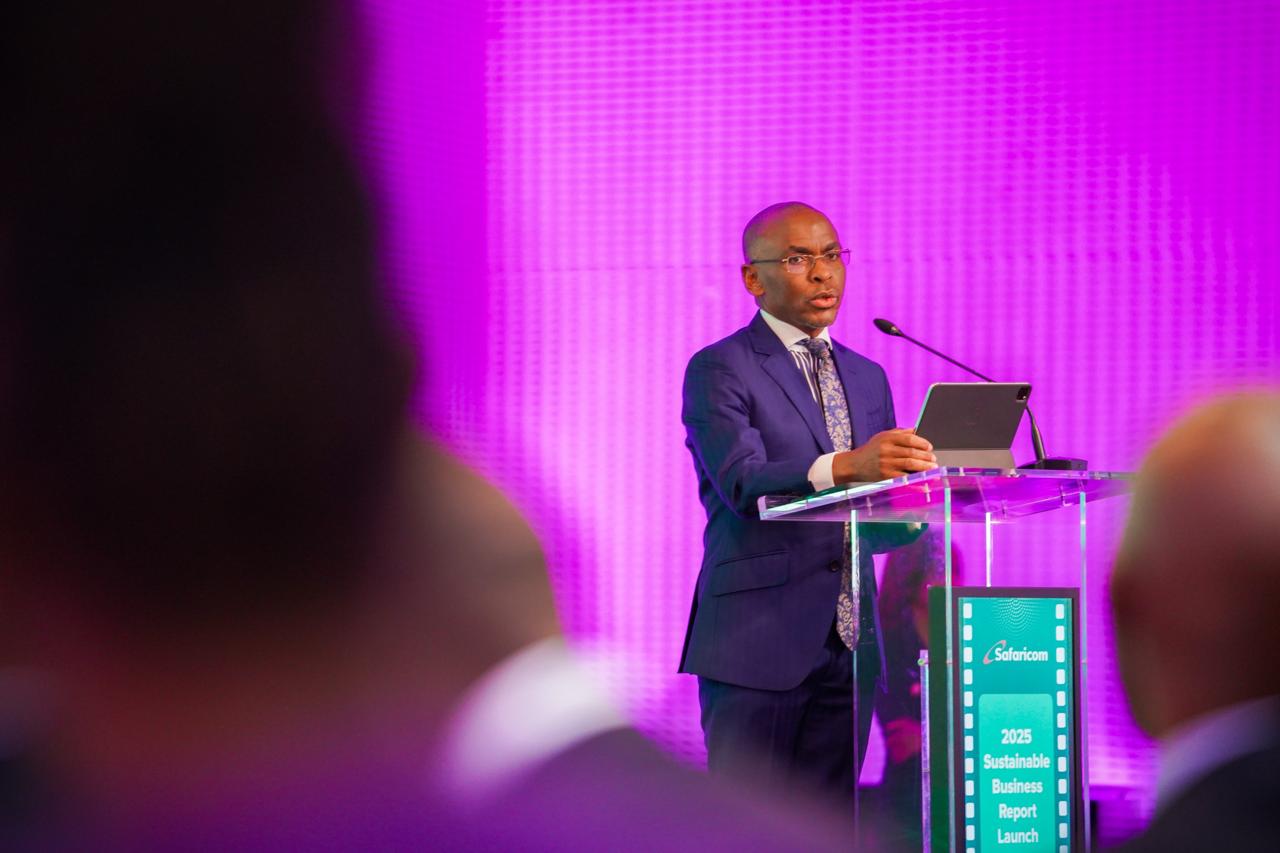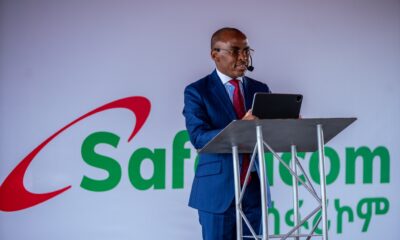Business
Safaricom’s Ethiopian Humbling: The Telecoms Giant That Built an Empire on Rigging the Game Now Faces Real Competition
Safaricom Ethiopia, the consortium’s ambitious $1.6bn bet on the Horn of Africa’s liberalising telecoms sector, has become a case study in corporate comeuppance.

Kenya’s mobile money behemoth discovers that market dominance requires more than just showing up when regulators actually enforce the rules. A damning World Bank report exposes just how badly the gamble has failed.
ADDIS ABABA—There is a certain poetic justice watching Safaricom, the Kenyan telecoms colossus that spent two decades throttling competition at home, now squirm as Ethiopia’s Ethio Telecom deploys the very playbook that made M-Pesa untouchable.
The company that carved out a 90.8 per cent stranglehold on Kenya’s mobile money market through what can charitably be described as aggressive regulatory capture is learning a brutal lesson: when you cannot rig the game, you might not actually be very good at playing it.
Safaricom Ethiopia, the consortium’s ambitious $1.6bn bet on the Horn of Africa’s liberalising telecoms sector, has become a case study in corporate comeuppance.
A World Bank assessment released this week has laid bare the extent of the disaster: $325m in losses for 2024 alone, revenues of just $53.6m that fail to even cover the $66.7m annual licence fees, and a market position so weak that Ethio Telecom generates twelve times more revenue despite the sector supposedly being liberalised.
After years of wielding exclusive agency agreements, on-net pricing discrimination, and strategic delays to interoperability requirements as weapons against Kenyan rivals Airtel and Telkom, Safaricom now finds itself on the receiving end of identical tactics. The irony would be delicious if it were not so catastrophically expensive for investors.
The Kenyan Playbook Returns to Haunt Its Author
Between 2007 and the mid-2020s, Safaricom constructed what competition economists politely call “network effects” and what everyone else recognises as a government-blessed monopoly. M-Pesa’s dominance was not merely the result of first-mover advantage or superior technology. It was systematically engineered through practices that would have triggered antitrust investigations in properly regulated markets.
The company locked up exclusive distribution through tens of thousands of agents who were contractually prohibited from offering rival services. It priced on-net transactions cheaper than off-net ones, creating artificial switching costs. When Kenya’s Communications Authority finally mandated mobile money interoperability in 2018, Safaricom deployed every procedural delay available, ensuring M-Pesa’s market share was essentially unassailable by the time Airtel Money and T-Kash could finally connect in 2022.
By first quarter 2025, M-Pesa commanded 90.8 per cent of Kenya’s mobile money market. This is not competition. This is conquest.
Now Ethiopia’s state-owned Ethio Telecom, alongside compliant regulators in Addis Ababa, has apparently studied Safaricom’s Kenyan masterclass with admirable attention to detail. The World Bank report catalogues the abuse with clinical precision: restricted wallet interoperability, on-net and off-net price discrimination, service bundling to create lock-in, predatory pricing that undercuts sustainable business models, punitive infrastructure leasing rates, and systematic regulatory favouritism.
It is Safaricom’s own greatest hits album, played back at full volume.
The World Bank’s Devastating Autopsy
The “Ethiopia Telecom Market Assessment,” launched by the World Bank and Digital Development Partnership this week, reads like an indictment of everything Safaricom assumed would work in its favour. Instead, it exposes a company haemorrhaging cash while fighting an opponent wielding state power as both sword and shield.
The numbers are quietly catastrophic. Safaricom Ethiopia’s $53.6m in revenues for fiscal 2024 cannot cover even its $66.7m annual licence obligations, the cost of the $850m licence fee it paid in May 2021 amortised over fifteen years. The company has burned through $325m in a single year, bringing cumulative losses since launch to well over half a billion dollars against initial funding of $1.6bn.
This raises what the World Bank delicately terms “concerns about long-term investment sustainability and return on capital.” In plainer language: Safaricom Ethiopia is a financial black hole, and someone will eventually need to explain to shareholders how a company that prints money in Kenya managed to incinerate it in Ethiopia.
The structural disadvantages are almost comical in their severity. Ethio Telecom prices voice calls below the mobile termination rate set by regulators, meaning Safaricom loses money on every single call made to Ethio Telecom’s customers because it must match those prices to remain competitive. The World Bank estimates these MTR losses at $1.6m monthly, or nearly $20m annually, a quiet bleed that compounds the company’s revenue challenges.
Meanwhile, Ethio Telecom offers data at 16 cents per gigabyte, rates the World Bank describes as potentially unsustainable when African operators rarely price below 25 cents per GB. But sustainability matters only if you care about profit. When you are a state-owned enterprise tasked with suppressing foreign competition, profitability is optional. Market control is not.
IDU-a026d983-6657-497a-8b99-5b873649b929Infrastructure as Economic Warfare
Perhaps the most insidious aspect of Safaricom’s Ethiopian predicament is its complete dependence on the very competitor trying to destroy it. The company pays Ethio Telecom $3m annually merely to rent infrastructure, effectively funding its rival’s wholesale revenue stream while attempting to compete for retail customers.
The World Bank’s assessment notes dryly that “the absence of independent tower companies and infrastructure companies has constrained options for cost-effective deployment and slowed network expansion while simultaneously increasing EthioTel’s wholesale revenue, reinforcing asymmetries in market structure.”
Translation: Safaricom is paying protection money to the mafia while trying to open a competing business on the same street.
The company’s capital expenditure has exceeded $2.2bn as it attempts to build out parallel infrastructure in a country where the incumbent already owns everything. This is not competition. This is a war of attrition Safaricom cannot win without either massive additional capital injections or regulatory intervention that forces true structural separation between Ethio Telecom’s wholesale and retail operations.
Neither appears forthcoming. The World Bank, which has $100m exposed through its International Finance Corporation, is reduced to pleading with Ethiopian authorities to investigate anticompetitive practices and “ensure fair pricing for leased network access.” One does not need a degree in political economy to recognise that a government 100 per cent owner of the incumbent has limited incentive to handicap its own asset for the benefit of foreign investors.
The M-Pesa Catastrophe: When Your Trump Card Gets Blocked
Safaricom’s crown jewel, M-Pesa, was supposed to be its Ethiopian trump card. With over 32 million users in Kenya and proven ability to drive financial inclusion, mobile money was meant to differentiate Safaricom Ethiopia from the incumbent and create the sticky network effects that made the Kenyan operation unassailable.
Instead, M-Pesa has become a case study in how incumbents strangle challengers. The World Bank report alleges that Ethio Telecom has recently blocked access to Safaricom apps, including M-Pesa, a technical stranglehold that would be illegal in markets with functioning competition authorities but apparently passes without sanction in Addis Ababa.
Even when M-Pesa functions, it faces structural sabotage. Ethio Telecom’s Telebirr mobile money platform, launched in May 2021 before Safaricom even entered the market, offers discounts to customers who purchase data packages through its service. This creates what the World Bank calls a “club effect” that locks users into Ethio Telecom’s ecosystem. It is the identical bundling strategy Safaricom used to devastating effect in Kenya, now deployed against them.
The report also raises concerns about “possible preferential arrangements for state-owned enterprises in handling government mobile money transactions,” which, if true, would exclude Safaricom from a significant revenue stream while simultaneously validating Telebirr as the government-endorsed platform. In a country where state employment and contracts drive enormous transaction volumes, this alone could prove insurmountable.
This is precisely what happened to Airtel Money and Telkom’s T-Kash in Kenya, which could never recover from M-Pesa’s five-year head start and structural advantages even after interoperability was mandated. Safaricom’s executives understand this dynamic intimately because they engineered it. They simply never imagined being on the wrong side of it.
When the Incumbent Advantage Meets the Incumbent
The fundamental miscalculation in Safaricom’s Ethiopian adventure was assuming that being a dominant incumbent in one market translates to competitive advantage in another. It does not, particularly when you are challenging an actual incumbent with state backing and a 127-year head start.
Ethio Telecom entered the competitive era with 100 per cent market coverage, every mobile tower, all the fibre optic infrastructure, and reflexive customer loyalty built over generations. It generated close to $700m in revenues in fiscal 2024 while Safaricom Ethiopia managed barely $54m. This thirteen-to-one revenue ratio in a supposedly liberalised market reveals everything about whose competition this really is.
The Ethiopian government awarded Safaricom a licence requiring an $850m fee while Ethio Telecom paid nothing, an asymmetry the World Bank pointedly highlights. Safaricom paid $1bn in total licensing costs while the incumbent paid zero, yet somehow regulators determined Ethio Telecom holds significant market power in six market segments and Safaricom in precisely one. The designated victim has been identified, and it is not wearing the state’s colours.
Regulatory Arbitrage: The Drug Safaricom Can No Longer Get
Perhaps the most telling aspect of Safaricom’s Ethiopian struggles is how much the company’s Kenyan success depended on regulatory favour. In Kenya, Safaricom has historically enjoyed what analysts describe as a “special relationship” with government, rooted in the state’s 35 per cent ownership stake through the Treasury. This translated into licensing advantages, delayed enforcement of competition requirements, and a general reluctance to impose penalties that might damage the cash cow providing 5 per cent of Kenya’s GDP.
Ethiopia offers no such indulgence. The Ethiopian Communications Authority is protecting Ethio Telecom with the same vigour Kenya’s regulators protected Safaricom. The Ethiopian government, which retains 100 per cent ownership of Ethio Telecom despite privatisation promises, has little incentive to kneecap its revenue generator for a foreign entrant, particularly one perceived as representing Kenyan capital.
The World Bank’s plea for authorities to “take measures to correct what it sees as unfair competition” and its suggestion that “these concerns warrant further investigation by national authorities” has the plaintive quality of an organisation that knows its $100m is underwater but lacks the leverage to force remediation. When your debtor is a sovereign government and your borrower is losing $325m annually, the negotiating position is weak.
The Financial Reckoning
The arithmetic is becoming impossible to ignore. Safaricom Ethiopia has burned through cumulative losses exceeding $500m since launch, against initial funding of $1.6bn. At a $325m annual loss rate, the company will exhaust remaining capital within three to four years without significant additional investment.
That investment must come from somewhere. The Kenyan parent company, while profitable, faces slowing growth at home, currency pressures, a 2025 technology and innovation levy that threatens margins, and shareholder demands for dividends that have made Safaricom a darling of the Nairobi Securities Exchange. Explaining to those shareholders why they should fund a bottomless Ethiopian liability while receiving reduced payouts requires rhetorical skills even the most accomplished CEO would struggle to muster.
Vodafone and Vodacom, the other consortium members, have their own capital allocation priorities and declining patience for emerging market adventures that generate losses rather than returns. The World Bank’s IFC, with $100m exposed, is now publishing reports that essentially argue its own investment thesis has failed. And the Japanese trading house Sumitomo, while deep-pocketed, did not build its reputation through infinite tolerance for cash incinerators.
The company requires an estimated additional $500m minimum to achieve national coverage and a path to profitability, funds that must be raised while the business case deteriorates monthly. In corporate finance, this is what precedes either dramatic strategic pivots or elegant exits.
What Safaricom’s Struggle Reveals About “Fair Competition”
The uncomfortable truth embedded in Safaricom’s Ethiopian misadventure is that genuinely fair competition in telecommunications is exceedingly rare, particularly in developing markets where spectrum is limited, infrastructure costs are prohibitive, and governments view telecoms as strategic assets.
Safaricom did not dominate Kenya through superior innovation alone. It dominated through structural advantages, regulatory capture, and ruthless suppression of competitive threats. Now it complains, through the voice of the World Bank, that Ethiopia is doing the same thing.
This is not to absolve Ethio Telecom or Ethiopian regulators, whose anticompetitive practices are genuine obstacles to market efficiency and consumer welfare. But it does expose the hypocrisy of Safaricom’s positioning as a victim of unfair competition when its entire business model in Kenya was built on ensuring competition remained theoretical rather than actual.
The World Bank’s proposed remedies read like a wishlist Kenyan competitors have been presenting to the Communications Authority for fifteen years: ensure fair pricing for leased network access, remove bureaucratic barriers to market entry, investigate preferential treatment of state-owned enterprises, enforce true interoperability, and create structural separation between wholesale and retail operations. Every single recommendation is something Safaricom successfully resisted or circumvented in its home market.
The Path Forward: Survive Until the Rules Change
Safaricom Ethiopia’s realistic path to viability has little to do with outcompeting Ethio Telecom and everything to do with outlasting current regulatory dynamics. If Ethiopia genuinely commits to telecoms liberalisation, enforces interoperability, prevents below-cost pricing, and reduces state favouritism toward the incumbent, Safaricom’s superior capital base, technical expertise, and product innovation could eventually translate into sustainable market share.
That is a significant “if” contingent on political developments in one of Africa’s most unpredictable countries, where a government facing foreign exchange crises, debt restructuring negotiations, and ongoing security challenges has minimal incentive to sacrifice the reliable revenues and strategic control that Ethio Telecom provides.
Alternatively, Safaricom could pursue the strategy it used in Kenya: wait for the incumbent to stumble, lobby intensively for regulatory intervention through multilateral pressure (hence the conveniently timed World Bank report), and gradually expand through agent networks and corporate partnerships until switching costs make customer retention inevitable.
The challenge is that Ethio Telecom, unlike Kenya’s fragmented competitors, is not stumbling. It holds every structural advantage Safaricom enjoyed at home and is deploying them with clinical precision. The World Bank’s assessment makes clear that Ethio Telecom is pricing below sustainable levels precisely because it can afford to, using state resources to wage a war of attrition that Safaricom, for all its Kenyan profits, cannot match indefinitely.
Starlink and the Escape Hatch No One Wants to Discuss
Tellingly, the World Bank’s report recommends Ethiopia consider licensing satellite operators like Starlink and OneWeb to “maximize connectivity and digitization” in remote areas. On the surface, this appears to be about rural access and humanitarian response. In reality, it represents an acknowledgment that traditional terrestrial competition in Ethiopia may be structurally impossible.
If low earth orbit satellite providers enter the Ethiopian market with minimal licensing requirements and no infrastructure dependencies on Ethio Telecom, they would instantly undermine the incumbent’s pricing power and coverage advantages. This is precisely why the Ethiopian Communications Authority has shown no appetite for implementing such licences despite the World Bank’s urging.
It is also why Safaricom might quietly welcome such disruption, even though satellite operators would compete with its own offerings. Anything that damages Ethio Telecom’s stranglehold improves Safaricom’s relative position. The enemy of my enemy becomes my friend, even when that enemy is offering cheaper service to my potential customers.
The Lesson: Monopoly Habits Die Hard
Safaricom’s Ethiopian expedition has revealed what many competition economists suspected: the company’s Kenyan dominance owed more to market structure than management brilliance. When forced to compete on genuinely level terrain, or in this case terrain tilted violently against them, Safaricom looks ordinary at best and incompetent at worst.
The company built an empire in Kenya not through fair competition but through its systematic absence. Now, encountering the same obstacles it once imposed on others, Safaricom is discovering that market dominance is not transferable and that regulatory capture is a game that only works when you own the regulators.
The World Bank’s assessment, for all its technical language and diplomatic phrasing, amounts to an admission that the Ethiopian telecoms liberalisation experiment has failed, at least for the foreign entrant that paid $850m for the privilege of losing $325m annually. The report’s recommendations will almost certainly be ignored by authorities with no incentive to implement them, leaving Safaricom Ethiopia to either secure massive new capital injections, dramatically reduce its ambitions, or begin the uncomfortable conversation about exit strategies.
There is something almost Shakespearean about watching Kenya’s telecoms titan, which spent two decades perfecting the art of anticompetitive behaviour, now publishing World Bank reports complaining that someone else is doing it better. The company that made rivals pay termination rates while undercutting on pricing now loses $1.6m monthly to the identical strategy. The company that restricted interoperability to protect M-Pesa now finds its own apps blocked. The company that leveraged government relationships to maintain dominance now faces a government that considers it an interloper.
The market, as it turns out, can be ruthlessly fair in its irony. And the bill for two decades of monopolistic behaviour in Kenya is now being paid, with interest, in Addis Ababa.
Kenya Insights allows guest blogging, if you want to be published on Kenya’s most authoritative and accurate blog, have an expose, news TIPS, story angles, human interest stories, drop us an email on [email protected] or via Telegram
-

 Grapevine7 days ago
Grapevine7 days agoAlleged Male Lover Claims His Life Is in Danger, Leaks Screenshots and Private Videos Linking SportPesa CEO Ronald Karauri
-

 Lifestyle1 week ago
Lifestyle1 week agoThe General’s Fall: From Barracks To Bankruptcy As Illness Ravages Karangi’s Memory And Empire
-

 Grapevine3 days ago
Grapevine3 days agoRussian Man’s Secret Sex Recordings Ignite Fury as Questions Mount Over Consent and Easy Pick-Ups in Nairobi
-

 Investigations2 weeks ago
Investigations2 weeks agoEpstein Files: Sultan bin Sulayem Bragged on His Closeness to President Uhuru Then His Firm DP World Controversially Won Port Construction in Kenya, Tanzania
-

 News2 weeks ago
News2 weeks agoAUDIT EXPOSES INEQUALITY IN STAREHE SCHOOLS: PARENTS BLED DRY AS FEES HIT Sh300,000 AGAINST Sh67,244 CAP
-

 Business2 weeks ago
Business2 weeks agoKRA Can Now Tax Unexplained Bank Deposits
-

 Investigations1 week ago
Investigations1 week agoEpstein’s Girlfriend Ghislaine Maxwell Frequently Visited Kenya As Files Reveal Local Secret Links With The Underage Sex Trafficking Ring
-

 News1 week ago
News1 week agoState Agency Exposes Five Top Names Linked To Poor Building Approvals In Nairobi, Recommends Dismissal After City Hall Probe























